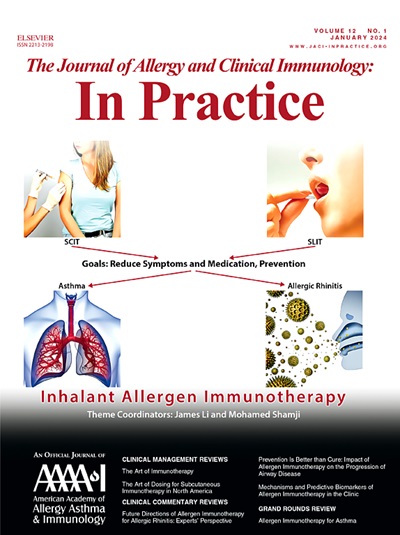Clinical and Immunological Prognostic Factors With Novel Variants in a Large Cohort of Diacylglycerol Acyltransferase 1 Deficiency
IF 6.6
1区 医学
Q1 ALLERGY
Journal of Allergy and Clinical Immunology-In Practice
Pub Date : 2025-09-01
DOI:10.1016/j.jaip.2025.03.026
引用次数: 0
Abstract
Background
Biallelic variants in diacylglycerol acyltransferase 1 (DGAT1) genegene have been implicated congenital diarrhea and protein-losing enteropathy. Insights into the immunopathologic features of this ultrarare disorder remain scarce, with only one cohort published to date.
Objective
To delineate the clinical presentations, laboratory and immunologic profiles, and therapeutic responses associated with DGAT1 deficiency and identify prognostic indicators that affect survival rates.
Methods
In this multicenter retrospective analysis of a comprehensive cohort of nine patients carrying seven novel variants, each displaying distinct phenotypic features, we recorded clinical, immunologic, and laboratory data of patients and evaluated the impact of various factors on prognosis.
Results
A total of 67% of patients (n = 6) exhibited symptoms during the first month of life, whereas one demonstrated symptom onset after 6 months. Moreover, 78% of patients (n = 7) presented with diarrhea, all of whom all had vomiting, failure to thrive, hypoalbuminemia, and hypogammaglobulinemia as the advent of protein-losing enteropathy. Patients with reduced CD4+ T-cell frequency (n = 2) exhibited severe infections with unexpected bacteria during the follow-up. Despite immunoglobulin replacement therapy, 45% of patients (n = 4) died of infective complications. A decreased CD4+/CD8+ T-cell ratio was observed in all deceased patients whose colon biopsy samples showed marked inflammation or apoptosis. Early fat-restricted nutrition extended survival, whereas early symptom onset, recurrent severe infections, and a reduced CD4+/CD8+ T-cell ratio were associated with less favorable outcomes.
Conclusions
Our findings advocate early fat restriction as a critical therapeutic strategy. Given the heightened risk of severe infections, antibiotic prophylaxis can be recommended in addition to immunoglobulin replacement therapy for DGAT1-deficient patients exhibiting lymphopenia or diminished CD4+ T cells.
大队列DGAT1缺乏症的临床、免疫预后因素和新变异。
背景:DGAT1的双叶变异与导致先天性腹泻和蛋白丢失性肠病(PLE)有关。对这种超罕见疾病的免疫病理特征的了解仍然很少,迄今为止只发表了一个队列:描述与 DGAT1 缺乏相关的临床表现、实验室和免疫学特征以及治疗反应,并确定影响存活率的预后指标:在这项多中心回顾性分析中,我们记录了患者的临床、免疫学和实验室数据,并评估了各种因素对预后的影响:67%的患者(6 人)在出生后的第一个月出现症状,其中一人在六个月后才出现症状。78%的患者(7 人)表现为腹泻,其中所有患者都表现为呕吐、发育不良、低白蛋白血症和低丙种球蛋白血症,这是 PLE 的先兆。CD4+ T细胞数量减少的患者(2例)在随访期间出现了严重的感染,感染了意想不到的细菌。尽管使用了免疫球蛋白替代疗法(IgRT),但仍有45%的患者(4人)死于感染并发症。所有死亡患者的 CD4+/CD8+ T 细胞比率均有所下降,结肠活检样本显示出明显的炎症或细胞凋亡。早期脂肪限制营养延长了患者的生存期,而早期症状出现、反复严重感染和CD4+/CD8+ T细胞比率降低则与较差的预后有关:我们的研究结果主张将早期脂肪限制作为一项重要的治疗策略。鉴于严重感染的风险增加,对于淋巴细胞减少或 CD4+ T 细胞减少的 DGAT1 缺乏患者,除了 IgRT 外,还建议使用抗生素预防。
本文章由计算机程序翻译,如有差异,请以英文原文为准。
求助全文
约1分钟内获得全文
求助全文
来源期刊

Journal of Allergy and Clinical Immunology-In Practice
ALLERGYIMMUNOLOGY-IMMUNOLOGY
CiteScore
11.10
自引率
9.60%
发文量
683
审稿时长
50 days
期刊介绍:
JACI: In Practice is an official publication of the American Academy of Allergy, Asthma & Immunology (AAAAI). It is a companion title to The Journal of Allergy and Clinical Immunology, and it aims to provide timely clinical papers, case reports, and management recommendations to clinical allergists and other physicians dealing with allergic and immunologic diseases in their practice. The mission of JACI: In Practice is to offer valid and impactful information that supports evidence-based clinical decisions in the diagnosis and management of asthma, allergies, immunologic conditions, and related diseases.
This journal publishes articles on various conditions treated by allergist-immunologists, including food allergy, respiratory disorders (such as asthma, rhinitis, nasal polyps, sinusitis, cough, ABPA, and hypersensitivity pneumonitis), drug allergy, insect sting allergy, anaphylaxis, dermatologic disorders (such as atopic dermatitis, contact dermatitis, urticaria, angioedema, and HAE), immunodeficiency, autoinflammatory syndromes, eosinophilic disorders, and mast cell disorders.
The focus of the journal is on providing cutting-edge clinical information that practitioners can use in their everyday practice or to acquire new knowledge and skills for the benefit of their patients. However, mechanistic or translational studies without immediate or near future clinical relevance, as well as animal studies, are not within the scope of the journal.
 求助内容:
求助内容: 应助结果提醒方式:
应助结果提醒方式:


